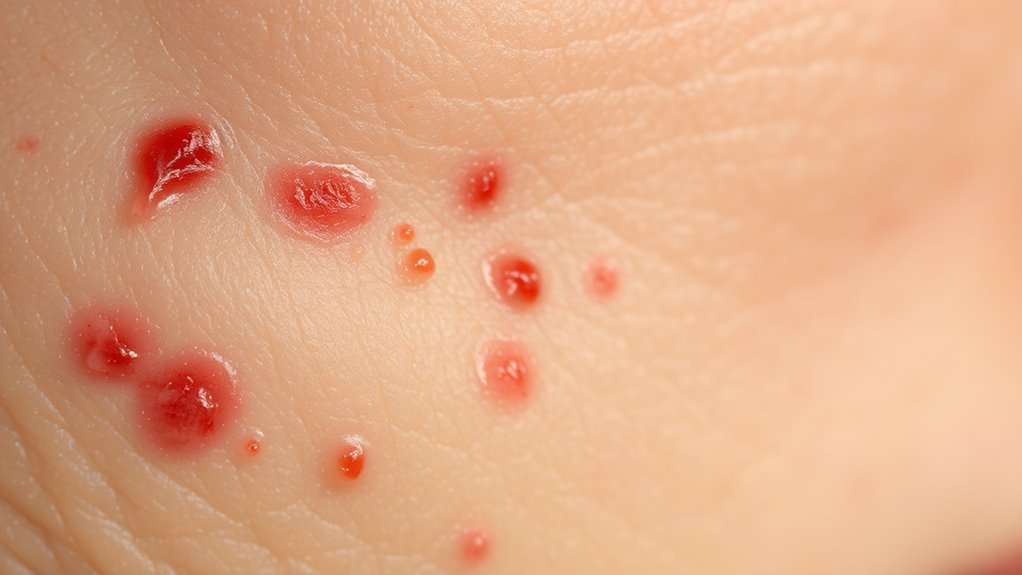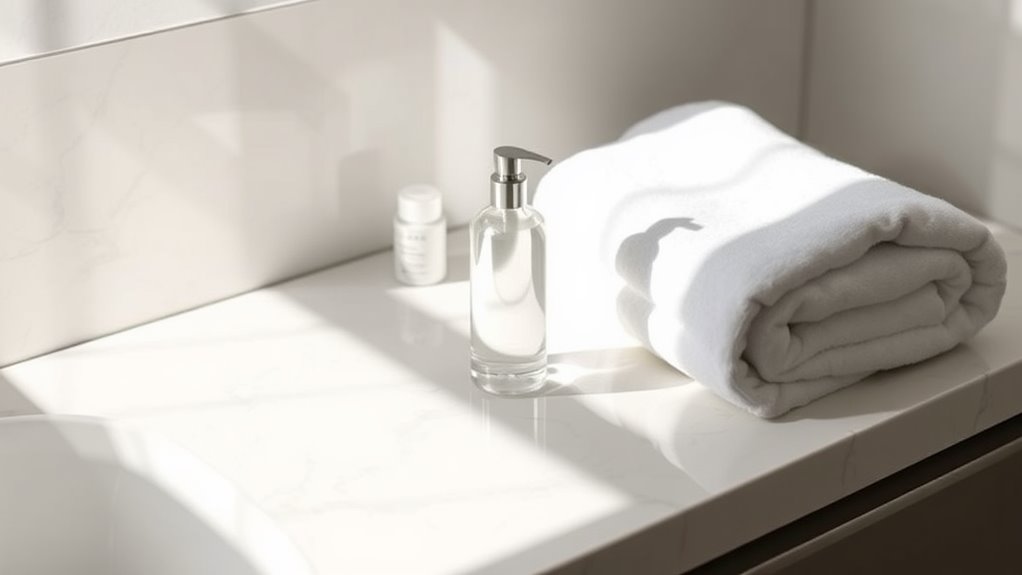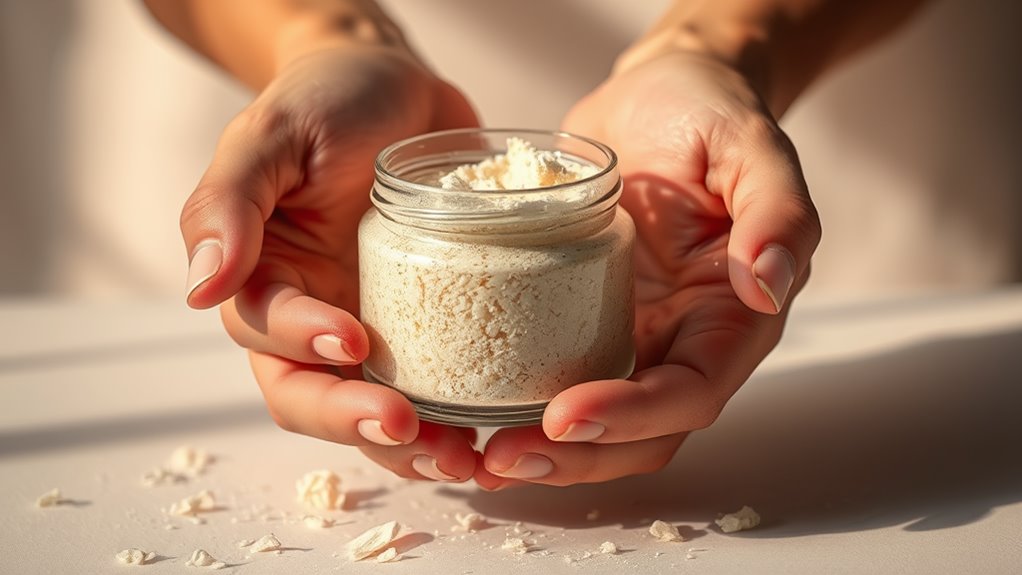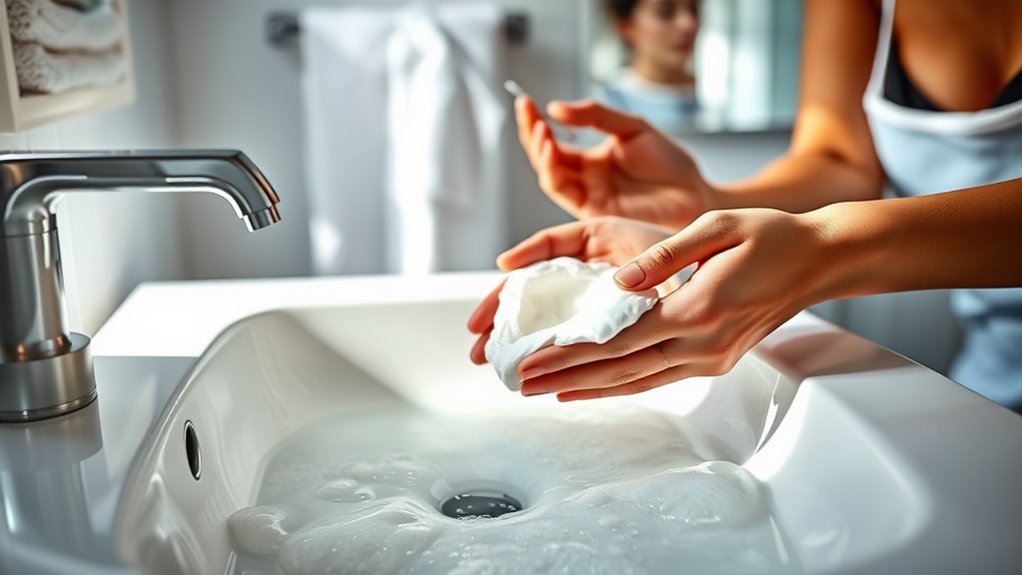These Hidden Signs Mean Your Skin Barrier Is Damaged
If you notice increased sensitivity, redness, persistent dryness, or frequent breakouts, your skin barrier might be damaged. Tightness and discomfort along with an uneven texture can signal moisture loss. Excess oil production often leads to dullness and can indicate an imbalance. Be aware of allergic reactions to your products as well. It’s crucial to identify these hidden signs early, as they could lead to more significant issues. Discover additional insights on how to support your skin barrier effectively.
Key Takeaways
- Increased sensitivity and redness indicate a compromised skin barrier, leading to inflammation and potential allergic reactions to products.
- Persistent dryness, flakiness, and tightness suggest the skin barrier is failing to retain moisture, causing discomfort.
- Frequent breakouts and excess oil production often signal an imbalance in the skin barrier, resulting in clogged pores.
- Uneven skin texture and dullness can arise from environmental damage and a damaged barrier, leading to a tired appearance.
- Strengthening the skin barrier with hydrating ingredients like ceramides and hyaluronic acid is crucial for restoring skin health.
Increased Sensitivity and Redness
When your skin barrier is compromised, you might notice increased sensitivity and redness as immediate signs.
These symptoms often manifest as a heightened reaction to products, environmental factors, or even temperature changes. You may find that your skin stings, burns, or reacts negatively to previously well-tolerated ingredients.
This heightened sensitivity is a clear indicator of damaged skin barrier signs, suggesting that your skin’s protective layer is failing to retain moisture and shield against irritants. A compromised skin barrier can lead to further issues, making it essential to address these symptoms promptly.
Redness can also indicate inflammation, signaling that your skin is struggling to maintain its integrity.
Addressing these issues promptly through appropriate skincare regimens can help restore your barrier function and alleviate discomfort, allowing your skin to regain its resilience.
Persistent Dryness and Flakiness
If you notice persistent dryness and flakiness in your skin, it’s likely a sign that your skin barrier is damaged. This condition occurs when the barrier’s ability to retain moisture is compromised, leading to dehydration. Your skin may feel tight, rough, and uncomfortable.
Environmental factors, such as harsh weather or exposure to irritants, can exacerbate this issue. Additionally, using overly aggressive skincare products may strip your skin of essential oils, further contributing to the problem.
To restore balance, focus on hydrating ingredients like hyaluronic acid and ceramides. It’s also important to avoid overly aggressive products that may further damage your skin barrier. Avoid hot showers and opt for gentle, pH-balanced cleansers.
Frequent Breakouts and Acne
If you’re experiencing frequent breakouts and acne, it may signal an imbalance in your skin barrier.
Increased oil production often accompanies inflammation and irritation, leading to clogged pores and blemishes.
Understanding these factors can help you address the underlying issues affecting your skin’s health. Additionally, a common acne skincare mistake could be hindering your progress towards clearer skin.
Increased Oil Production
A compromised skin barrier can lead to increased oil production, often resulting in frequent breakouts and acne.
When your skin struggles to retain moisture, it compensates by overproducing oil, which clogs pores and exacerbates acne.
To address this issue, consider the following strategies:
-
Hydrate: Use a gentle moisturizer to restore balance without clogging pores.
-
Exfoliate: Regularly exfoliate to remove dead skin cells and prevent pore blockages.
-
Avoid Harsh Products: Steer clear of overly drying cleansers or treatments that can further irritate your skin.
-
Check Your Diet: Incorporate a balanced diet rich in antioxidants to support skin health.
Inflammation and Irritation
While a damaged skin barrier often leads to increased oil production, it can also manifest as inflammation and irritation, resulting in frequent breakouts and acne.
When your skin barrier is compromised, it struggles to retain moisture and defend against environmental aggressors. This imbalance triggers inflammation, causing redness, swelling, and discomfort.
As your skin reacts, clogged pores and bacterial growth can exacerbate acne formation. To restore balance, focus on gentle cleansing and hydrating products that reinforce the barrier.
Ingredients like ceramides and niacinamide can soothe inflammation and promote healing. Avoid harsh exfoliants and over-cleansing, which can worsen irritation.
Tightness and Discomfort
When your skin barrier is compromised, you may notice an uncomfortable tightness that can be both irritating and distressing. This sensation often signals that your skin lacks moisture and protection.
To assess your tightness and discomfort, consider the following:
- Dry patches: Observe areas that feel rough or scaly.
- Sensitivity: Notice if your skin reacts negatively to products that previously felt soothing.
- Redness: Check for increased redness in areas experiencing tightness.
- Flakiness: Look for skin that peels or flakes, indicating dehydration.
Addressing these signs promptly can help restore your skin barrier and alleviate discomfort. Additionally, be aware that hidden causes of dry skin can exacerbate these symptoms, making it important to identify and address them effectively.
Uneven Skin Texture
Uneven skin texture can be a result of various factors, including environmental damage and improper skincare.
You might notice symptoms like rough patches or enlarged pores that indicate a compromised skin barrier.
Understanding the causes and exploring effective treatment options can help you achieve smoother, healthier skin. Additionally, over-cleansing can contribute to disrupting your skin barrier, leading to further texture issues.
Causes of Uneven Texture
Many factors can contribute to an uneven skin texture, making it essential to identify the underlying causes.
Understanding these can help you take targeted action for improvement. Here are four common causes:
-
Dehydration: Insufficient moisture can lead to rough, flaky patches.
-
Sun Damage: UV exposure can result in uneven pigmentation and texture changes.
-
Hormonal Fluctuations: Changes in hormone levels can affect oil production and skin cell turnover.
-
Poor Skincare Habits: Inconsistent routines or using harsh products can damage your skin barrier.
Symptoms to Observe
Identifying the symptoms of uneven skin texture is vital for effective skincare. You may notice dry patches, rough areas, or an overall lack of smoothness. These irregularities can manifest as bumps or flakiness, disrupting the skin’s natural appearance.
You might also experience fluctuations in oiliness, with some areas appearing excessively shiny while others remain dry. Additionally, fine lines or enlarged pores can become more pronounced, further contributing to an uneven feel.
If your skin feels tight or irritated, it’s a sign that your barrier may be compromised. Pay attention to these symptoms; recognizing them early can help you take proactive steps toward restoring your skin’s balance and achieving a more refined texture.
Treatment Options Available
If you’re dealing with uneven skin texture, a variety of treatment options can help restore your skin’s smoothness and balance.
Consider the following approaches:
-
Exfoliation: Use chemical exfoliants like AHAs or BHAs to slough off dead skin cells and promote cell turnover.
-
Moisturization: Choose a hydrating moisturizer containing ceramides or hyaluronic acid to support barrier repair.
-
Retinoids: Incorporate retinoids into your routine to stimulate collagen production and improve skin texture.
-
Professional Treatments: Explore options such as chemical peels, microdermabrasion, or laser therapy for deeper skin resurfacing.
Excess Oil Production
Excess oil production can be a clear sign of a compromised skin barrier. When your skin barrier is damaged, it struggles to retain moisture, prompting your sebaceous glands to overproduce oil in an attempt to compensate.
This excess sebum can lead to clogged pores, breakouts, and an uneven complexion. You might notice a shiny appearance, especially in the T-zone.
To address this, focus on restoring your skin barrier with gentle, hydrating products that contain ingredients like ceramides and hyaluronic acid. Avoid harsh cleansers and exfoliants that can further disrupt your barrier.
Dull and Lackluster Appearance
A dull and lackluster appearance often signals a damaged skin barrier. When your skin loses its ability to retain moisture and protect against external stressors, it can result in a tired, lifeless complexion.
To assess your skin’s health, consider these key factors:
-
Dehydration: Notice any tightness or flakiness? This may indicate moisture loss.
-
Uneven Texture: If your skin feels rough or bumpy, it’s a sign your barrier is compromised.
-
Sensitivity: Increased redness or irritation can result from environmental aggressors penetrating your skin.
-
Increased Breakouts: A damaged barrier can lead to clogged pores and acne flare-ups.
Recognizing these signs allows you to take action and restore your skin’s vitality effectively.
Allergic Reactions to Products
When your skin barrier is compromised, you may also experience allergic reactions to skincare products. This occurs because a damaged barrier can’t effectively protect your skin from irritants and allergens.
You might notice redness, itching, or swelling after using certain products, which signals that your skin can’t tolerate them. Ingredients like fragrances, preservatives, and certain oils are common culprits.
To identify allergens, conduct patch tests before trying new products. If you react, discontinue use immediately and consult a dermatologist for guidance.
Strengthening your skin barrier with hydrating ingredients like ceramides and hyaluronic acid can help restore its function, reducing the likelihood of future allergic reactions.
Prioritize your skin’s health, and choose products wisely to maintain its integrity.




